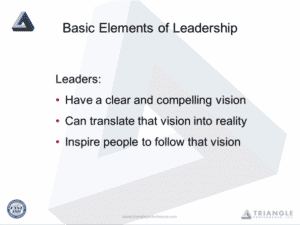—stop making this so hard

Sure, new hurdles arise, technology changes, business environments change, the economy changes, we invent new ways of doing things, etc., but human nature hasn’t changed since the time of Adam and Eve and neither has what it takes to lead other humans.
As leaders, we often find ourselves in new situations – positions, companies, teams – that require us to adapt how we lead, but nothing changes what we need to do to be an effective leader. Let’s stick to the basics: We have to know where we’re leading; we have to be able to communicate that to others; and we have to be able to motivate others to help us achieve the undertaking. Plain and simple. From the team leader on the shop floor to the C-suites, the basics don’t change.

So why the review of Leadership 101? Because there is so much “new” material out there about how we’ll need to lead in the coming post-pandemic era that uses big, strategic sounding words to obfuscate the leadership basics. Here’s an example I ran across from a well-known and respected business publication (paraphrased to remove the fancy language):
- We’ll have to adjust our strategic vision to account for recent changes in our business environment while remaining faithful to our company’s core values.
- We’ll need to communicate this new vision throughout the organization – including executable objectives as required – especially leveraging the media platforms that have matured over the last year (i.e., virtual town halls and team meetings).
- We’ll need to reassess how to keep our followers motivated to perform and succeed in a way that helps us to achieve the vision (or at least keep from demotivating them).
Duh.
In other words, successful leaders will need to do in the future what they’ve been able to do in the past. Might have well told us that to wash our hair in the future we’ll need to apply shampoo, lather, and rinse (repeat as necessary).
I’ve been helping a former colleague (now a senior executive in the Pentagon) adjust to a new leadership position this past year, and to say that there have been some challenges leading and building relationships with the team she’s inherited would be an understatement. Some were motivated professionals weary of slogging through the bureaucratic morass while others were entrenched, low-performing functionaries who fertilized the morass while waiting for retirement. You get the picture.

Without giving it much thought, she replied that she understood the direction the Department wanted her to advance her portfolio in and was clear on her boss’ priorities. She’d laid out her expectations to the team, including regular progress checks, and now she was going to get out of their way and let them do their work. They trusted her to have their backs and knew her motivation was to help them be successful.
Sounds a lot like Leadership 101, doesn’t it?
Leadership isn’t difficult, but we continue to make it more difficult to understand than we have to. On the other hand, leading people is hard, and we can only get better at it through practice. Why do we think we’re any different than athletes or welders or doctors and lawyers? The key to being successful is to start with the basics and continue practicing throughout our careers – or for the rest of our lives.
Leadership dummies? Not if we stop making it so difficult.
How about you, leaders?

